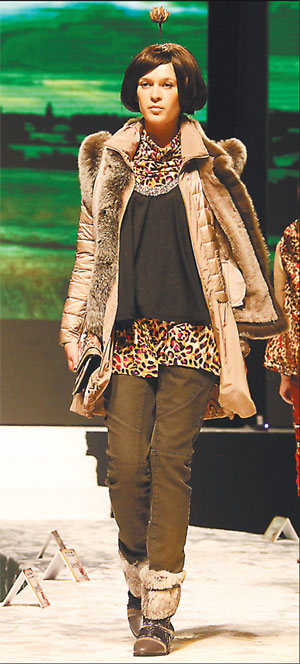Queen of Jeans
 |
|
Designer Tong Ying changes the stereotype image of jeans. Provided to China Daily |
One fashion designer finds star power in once-lowly denim, Gan Tian reports.
Designer Tong Ying says denim is a magic material. She can tell people's work by taking a look at their jeans.
A hip-hop dancer must have some torn parts on the jeans' knees, because he has to kneel down to make some good moves. A driver's denim shirts, however, have lighter color blocks around the upper arms, because these parts always rub on his body when he is driving.
That savvy inspired her to be a designer specialized in denim.
Tong was a fashion buyer in Hangzhou, Zhejiang province for five years. She found that not so many Chinese women are fascinated about jeans. For one thing, they seem too casual. For another, denim cannot deliver an elegant image.
"When we think of jeans, we always think of Levi's, Gap or Lee. But I want to create some unique jeans and denim costumes. I want to change Chinese people's, especially Chinese women's, stereotype image of jeans," the designer says.
She started her own label E-World in 2006. The label features Tong's creation of skin-tight pants, hippie miniskirts, over-sized jackets and female accessories. These products have one thing in common: Denim is the core material.
She has now opened around 10 boutiques in Beijing, Shanghai, Chongqing and second-tier cities like Changsha, Hunan province, and Wuhan, in Hubei province.
The must-buy item for this season is a pair of tight navy-blue jeans, Tong says. The jeans, like those traditional ones, have some washed parts. However, Tong adds some embroidery, pearls and gemstones, which give this pair a luxurious feel.
"I want to deliver this idea to denim fans: Jeans are not always casual," Tong says.
She looks for many ways of "creating a unique and luxurious style" for jeans. For example, she adds some Tencel, a biodegradable fabric made of wood-pulp cellulose, into raw denim material. The new materials are much softer and make wearers feel more comfortable.
Tong once accidentally burned a hole in the knee of a pair of jeans, but it suddenly occurred to her, why not add some laces around the rim of this hole? And that was the main theme of her 2009 spring/summer collection.
Because the denim culture was not born in China, consumers here don't know so much, for example, about how to care for denim products. Many customers just throw jeans into washing machine to clean them.
That would be a fatal problem for Tong's creations, she says, because her pieces have too many detailed accessories, which might be easily destroyed in a machine wash.
To cope with that, Tong designed tags with special washing tips for wearers.
"But the safest way is not to wash it. It is eco-friendly, and helps to keep its best shape," Tong suggests.
In her label's boutique stores, Tong also holds some seminars for her clients on denim culture and care.
Every time Tong has some new creations, she will put them on herself, stand in front of mirror and stare for a long time.
"From my mirror's image, I've found passion for jeans, and I believe more Chinese people will," Tong says.
Contact the writer at gantian@chinadaily.com.cn.
















